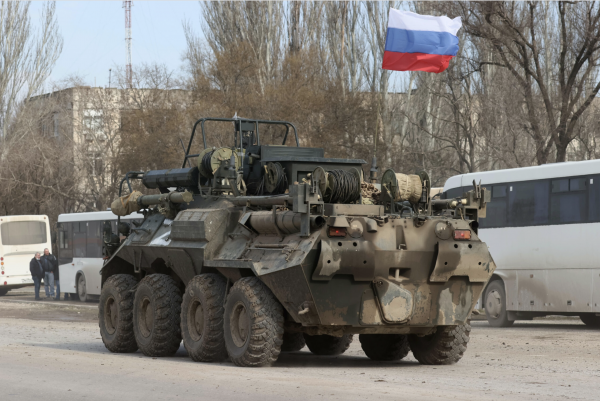Good evening, ladies and gentlemen. What a day THAT was. Our thoughts are with those fighting for their lives in Europe today. 🙏
After opening the session on a low note, all four indexes rallied and posted gains. The Nasdaq climbed 3.35% and closed the day at highs. The Russell 2K rose 2.64% and the S&P 500 spiffed up 1.50%. Read our story about the situation in Ukraine and its economic consequences below. 🌎
Lantheus Holdings leaped 39.12% today after crushing fourth quarter earnings and sales forecasts. $LNTH is up now up 38.95% YTD.
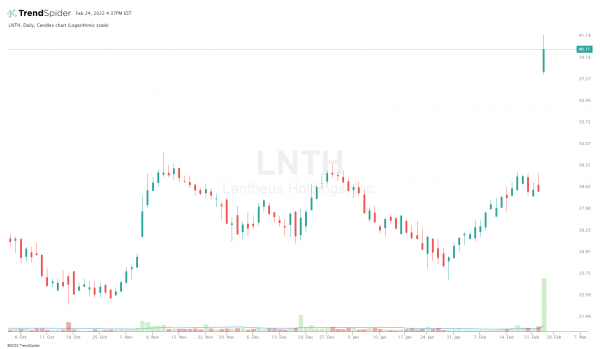
7/11 sectors finished green. Tech towered over all – $XLK surged 3.24%. Communications crawled 2.80% while consumer discretionary ascended 2.29%. Consumer staples crumbled 1.72% as the biggest loser.
Crypto turned things around after trading deep in the red this morning. 🤞 $BTC.X bounced 3.15% and $ETH.X expanded 2%.
Zscaler sank 17.25% in after-hours trading when the expected outlook range fell below analysts’ views. Catch this one in the earnings round-up below.
$SJI soared 39.86%, $POST popped 36.17%, $MKR.X marched 9%.
Here are the closing prices:
| S&P 500 | 4,288 | +1.50% |
| Nasdaq | 13,473 | +3.35% |
| Russell 2000 | 1,995 | +2.64% |
| Dow Jones | 33,223 | +0.28% |
Vladimir Putin Announces Russia’s Invasion Of Ukraine
As probably most (or all) of our readers have already heard, Russia has launched a full-scale invasion of Ukraine. At 6 am in Moscow today, Russian President Vladimir Putin signaled Ukraine’s invasion with a chilling speech citing Ukrainian aggression toward Russian citizens (these allegations are not confirmed) as the country’s primary reason for invading. Putin’s speech also indirectly addressed the west, as Putin commented that any country who attempts to prevent Russia’s invasion of Ukraine will experience “consequences greater than any you have faced in history.”
Russian Troops Enter Ukraine
After Putin’s speech, Russian troops poured into Ukraine from the country’s northern, eastern, and southern borders. Ukraine’s president, Volodymyr Zelensky, called Russia’s invasion “villainous” and said “From today our states are on different sides of world history. The Russian state is on the path of evil.” Similarly, President Joe Biden declared “Putin is the aggressor. Putin chose this war, and now he and his country will bear the consequences.”
As Russia seeks to “demilitarize” Ukraine, explosions, missiles, and combat are prevalent throughout the country — Zelensky told Ukraine’s citizens: “We are defending our freedom. Be ready to support your state on the squares of your cities.” Russia is specifically targeting the country’s critical infrastructure, like its airports, with missiles to destabilize Ukraine’s defensive efforts. Chernobyl, the abandoned nuclear power plant from the Soviet Union, has also been seized by Russian forces… according to Ukraine’s leader, Chernobyl’s seizure is an aggressive and dangerous act which may be “a declaration of war against the whole of Europe.” Chernobyl’s nuclear disaster, which occurred 36 years ago, is still leaking radioactive materials and, if disturbed, could wreak havoc across Europe.
The U.S. And Allies Respond
The U.S. and its allies, like the EU, have responded to Russia with additional harsh economic sanctions. Earlier this week, Germany shut off access to the Nord Stream 2 natural gas pipeline to demonstrate its opposition to a Ukrainian invasion. Today, President Joe Biden announced that Russia’s largest financial institutions (such as Sberbank, VTB, and their subsidiaries) will have no access to any U.S. financial infrastructure. The U.S. also disclosed a variety of new debt/equity restrictions on Russian businesses and institutions, further sanctions on wealthy Russian elites, economic sanctions against Belarus for assisting Russia in its invasion of Ukraine, and additional restrictions impeding Putin’s military and strategy operations.
Unfortunately, economic sanctions did not deter Russia’s initial invasion of Ukraine, and U.S. officials remain doubtful that additional sanctions will be successful.
The Dire Economic Consequences Of This Situation
Russia’s invasion of Ukraine will be felt across the globe. We’ve covered the possible economic consequences of a Russian invasion before, but here’s another list for your convenience: 💡
- Oil. Although Russia is not a member of OPEC, the country is a major exporter of oil. Specifically, Russia exports billions of dollars worth of crude petroleum, refined petroleum, and petroleum gas every year. Once Russia’s petroleum exportation is disrupted, it could cause crude prices (which already reached their highest levels since 2014 this week) to reach $120 or $150 per barrel, according to JPMorgan. This would be bad for the already-chaotic international oil supply, it could increase U.S. gas prices, and contribute to more inflation.
- Inflation. According to CNN, analysts estimate that an increase in oil prices above $110/barrel would result in a +10% YoY increase in inflation. This inflation would not just affect energy and oil — it would affect consumer goods and the rest of the U.S. economy, too.
- Fertilizer. Russia is the world’s biggest exporter of nitrogenous fertilizer, which is used to fertilize crops. Currently, both the U.S. and Europe import Russian fertilizer, which could have negative consequences on North America’s growing season. It’s still unknown the extent to which Russian sanctions could affect U.S. agriculture, but yesterday Bloomberg published: “It’s a very real possibility we see shortages for this coming year especially heading into the North American growing season.” This could mean crop shortages and higher food prices.
- The Economy. Increased oil prices will negatively impact the post-pandemic recovering U.S. GDP. If inflation reaches 10%, the Fed may have to hike rates even more aggressively to combat inflation, and we all know how investors feel about rate hikes (hint: not good.) Rate hikes would significantly increase the cost of borrowing, like for mortgages or car loans, for all Americans. Finally, the markets don’t like geopolitical conflict — although the market closed green today (miraculously?), tensions of Russia-Ukraine magnitude could likely result in widespread selloffs in the near future.
- Taiwan. The situation in Ukraine could be a green light to China signaling a Chinese invasion of Taiwan, which could be catastrophic for the already-struggling global semiconductor supply. On Putin’s invasion announcement, China began exhibiting increased aggression towards Taiwan, saying Taiwan is “not Ukraine” and is an “inalienable part of China.” In 2020-2021, Taiwan accounted for over 60% of the global semiconductor market, and semiconductors are used in the production of cell phones, cars, medical devices, and pretty much… all tech.
- Energy in the EU. Europe is dependent on Russia for natural gas. Germany announced that it would shut off the Nord Stream 2 natural gas pipeline in response to Russian aggression towards Ukraine, and now energy prices in the EU are climbing out of control — today, Dutch TTF gas futures surged 60% (prices not seen since 2005) and German power contracts exploded 42%.
We will continue reporting on the social, political, and economic consequences of Russia’s invasion of Ukraine. In the meantime, though, stay safe ya’ll. 🙏 Support one another. ❤️ 🇺🇸
Sponsored
Your Destination One Tap Away. Creating the world of tomorrow.

With a mission to shape the future of urban lifestyle through a customer-oriented tech approach, we are connecting users to what they love while transforming mobility.
Earnings
Earnings Today
Moderna moved up 15.1% today on the back of an earnings and sales beat. Covid vaccine sales are expected to reach $19 billion in 2022, up from $17 billion previously.
$MRNA | EPS: $11.29 (vs. $9.83 expected) | Revenue: $7.21 billion (vs. $6 billion expected) | Link to Report
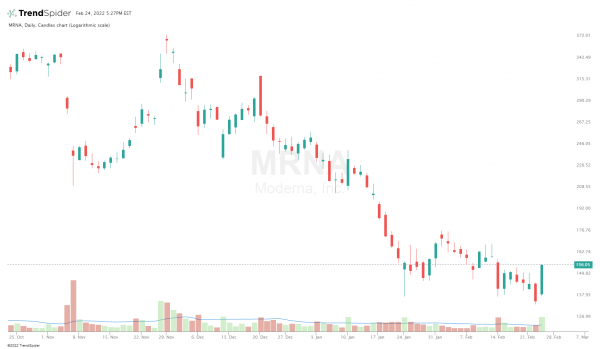
Zscaler dove 17.25% in extended trading, although it surpassed earnings and sales projections. $ZS is now down 18.05% in 2022.
$ZS | EPS: $0.13 (vs. $0.11 expected) | Revenue: $255.6 million (vs. $241.5 million expected) | Link to Report
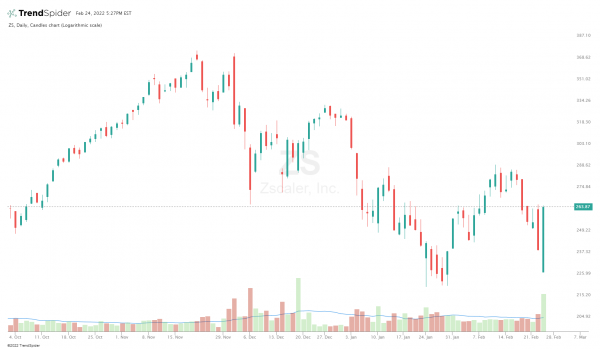
Coinbase topped expectations for earnings and sales handily, but trading volume is expected to drop in Q1. $COIN lost 3.65% after hours.
$COIN | EPS: $3.32 (vs. $1.95 expected) | Revenue: $2.5 billion (vs. $1.86 billion expected) | Link to Report
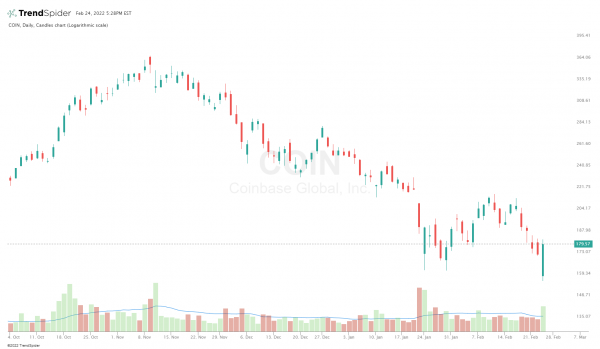
Crypto’s safe haven narrative collapsed today after Russia invaded Ukraine.
Bitcoin, the world’s largest cryptocurrency, fell 6.6% over the past 24 hours to $35,982 after Vladimir Putin’s attack on Ukraine. Yesterday, the crypto dropped as low as $34,338 – its lowest level since late January. 📉 Over the past three months, the top currency has lost almost half its value since its high of $68,990.
The second-largest cryptocurrency, Ethereum, also fell today, dropping 12% to hover around $2,627 as the Ukrainian crisis intensified. Vitalik Buterin, the co-founder of Ethereum who was born in Russia, strongly condemned Russian President Vladimir Putin after the country announced a “special military operation” in Ukraine. Buterin wrote on Twitter that he was “very upset by Putin’s decision” to abandon peaceful solutions in Russia’s dispute with Ukraine.
“This is a crime against the Ukrainian and Russian people,” Buterin wrote. “I want to wish everyone safety and security, even though I know there won’t be.” 🙏
Overall, the market capitalization of all cryptocurrencies dropped to $1.5 trillion in 24 hours, losing almost 9%. By the end of the day, some cryptocurrencies showed signs of recovery, but they failed to boost sentiments among investors.
Links
Links That Don’t Suck:
🤖 How The Tech Industry Is Responding to Russia’s Invasion of Ukraine
⚖️ SEC Opens Investigation into Elon Musk Over Possible Insider Trading
📉 What Russia’s Invasion of Ukraine Means for Investors
💰 Bitcoin Donations to the Ukrainian Military Are Soaring as Russia Invades
🚗 Ford Recalls Heavy-Duty Pickups Whose Drive Shafts Can Fracture


